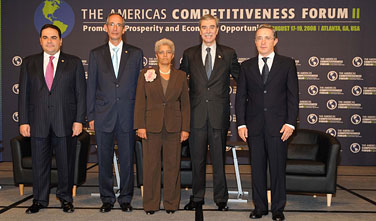|
|
|
||||||||
|
Improving Competitiveness through Innovation and Cooperation Secretary of Commerce Carlos M. Gutierrez welcomed more than 900 participants, including the presidents of Colombia, Guatemala, and El Salvador, to the Americas Competitiveness Forum 2008, which highlighted innovative methods for achieving economic competitiveness throughout the Western Hemisphere. by Peter Bowman On August 17–19, 2008, Carlos M. Gutierrez, secretary of commerce, and Shirley Franklin, mayor of Atlanta, Georgia, welcomed more than 900 participants to the second annual Americas Competitiveness Forum (ACF 2008). ACF 2008 highlighted innovative methods to achieve economic competitiveness from national, regional, and local perspectives.
President George W. Bush envisioned the creation of the ACF after the Summit of the Americas in November 2005, where he discussed ways to create jobs, to fight poverty, and to promote economic prosperity in the Americas. Although many countries in the region have enacted significant reforms and experienced solid economic growth during the past several years, the ACF was designed to deepen cooperation on competitiveness among the 34 democratically elected governments in the Western Hemisphere. ACF 2008 also provided businesses a platform to learn about and to take advantage of trade and investment opportunities. Senior commercial officers from throughout the hemisphere were on hand to meet with U.S. businesses and to conduct one-on-one export counseling sessions. The International Trade Administration facilitated approximately 200 meetings between the businesses and governments at ACF 2008. Twenty-six of the 34 democratically elected governments sent high-level government delegations. Presidents Alvaro Uribe of Colombia, Alvaro Colom of Guatemala, and Antonio Saca of El Salvador participated in the event, as well as Vice President Jaime Morales of Nicaragua. More than 25 ministers responsible for economic and competitiveness issues, including ministers of trade, commerce, science and technology, and education, also attended ACF 2008. Business Alliances, Energy, Trade, and Travel Highlighted The forum highlighted four key program areas: alliances in business and education, renewable energy and sustainable resources, trade logistics, and travel and tourism. The alliances in business and education track focused on identifying creative, flexible partnership models between governments, industry, and the academic community. The renewable energy and sustainable resources track highlighted opportunities in the renewable and alternative energy sector that are key to creating greater energy security and economic competitiveness. The trade logistics track emphasized the importance of logistics to trade and growth. The travel and tourism track underscored appropriate sustainable practices, infrastructure, and policies to support each country’s tourism development initiatives. In addition to the four main program tracks, regional market opportunity sessions provided attendees a chance to learn about doing business in each of the countries in the Western Hemisphere. Continuing the Conversation The ACF is an ongoing initiative. It will continue to provide a venue for government ministers from the Western Hemisphere to come together with leaders from the private sector, academia, and non-governmental organizations to explore cutting-edge ideas and best practices in several key areas of competitiveness. One notable outcome of ACF 2008 was a commitment by the participating countries to continue cooperating on economic issues. Other ACF outcomes include (a) increased trade and investment opportunities for attendees, (b) the Western Hemisphere textiles/apparel cooperation to promote further growth in the region’s textiles and apparel trade (see sidebar), and (c) the Latin American Small Business Initiative to help small businesses take advantage of trade opportunities in the Western Hemisphere. Meeting the Global Marketplace Challenge The region must strategically rise to the challenge of an increasingly global and competitive marketplace. Leaders of the public and private sectors must implement policies that expand opportunities for innovators and entrepreneurs who bring new ideas, technology, and capital. “Making everyone equal by making everyone poor is not a big, worthy challenge,” Gutierrez noted. “The challenge is to give everyone opportunities so everyone can improve their life. Everyone can improve their future. Everyone can improve their family. Everyone can have hope for having a more prosperous future.” The 2009 ACF will be held in Santiago, Chile, and will build on the success of this forum. For more information about ACF 2008, the final report from the forum, and the results of the Western Hemisphere Competitiveness Survey, visit the ACF’s Web site at www.competitivenessforum.org. Peter Bowman is an international economist with the International Trade Administration’s Market Access and Compliance unit.
|
|
